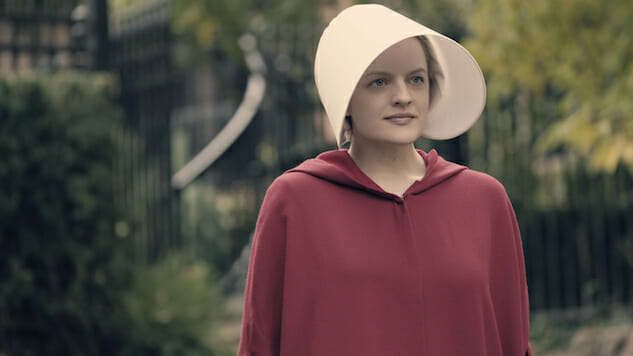The Handmaid’s Tale Premiere Traces the Border Between Bending and Breaking
(Episodes 1.01, 1.02 and 1.03)
George Kraychyk/Hulu
Editor’s Note: This essay covers the first three episodes of The Handmaid’s Tale, now streaming on Hulu.
At about the midway point of “Late,” the third episode of Hulu’s adaptation of The Handmaid’s Tale, Nick (Max Minghella), the kind but potentially dangerous driver for Commander Waterford (Joseph Fiennes), warns his boss’s handmaid, Offred (Elisabeth Moss), with a simple phrase: “Everybody breaks.”
A pithy bit of dialogue, for sure, but a perfect arrow right into the heart of these first three installments of this new series. Every character introduced within these hours has a moment of emotional or physical collapse, or a small glimmer of humanity that peeks out through the blank, bleak world they otherwise inhabit. For some, one follows the other, as their brushes of kindness are quickly countered with embarrassment or violence.
Hulu’s release of the first three episodes at once makes logistical sense. It sometimes takes even the best series a few weeks to settle into its voice and its story. But it is also thematically perfect, as the three are bookended by harrowing scenes of women being broken.
In the beginning, it’s Offred, back when she was known by her given name, June, who has her heart and world shattered when the forces of a theocratic government track down she and her family. In one moment, she loses both her husband and her daughter, the former killed, the latter taken away for good.
At the end of the three hours, it’s another handmaid, Ofglen (a gaunt and shattered Alexis Bledel), who is left torn asunder. In her case, though, it is her sexual agency that is quite literally ripped from her. After being caught in an illicit affair with another women (a “gender traitor,” in the parlance of this world), she has her clitoris removed. Or as the overseer for the handmaids, Aunt Lydia (Ann Dowd, in full skin-crawling evil mode), puts it, “You won’t want what you cannot have.”
The core of this series and the 1985 Margaret Atwood novel on which it’s based on is how much and how often women are willing and/or able to bend for the people around them before they break. And how many times they can break before they start fighting back or giving up entirely.
-

-

-

-

-

-

-

-

-

-

-

-

-

-

-

-

-

-

-

-

-

-

-

-

-

-

-

-

-

-

-

-

-

-

-

-

-

-

-

-








































